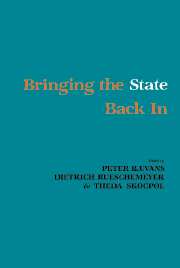Book contents
- Frontmatter
- Contents
- Preface
- Introduction
- Part I States as Promoters of Economic Development and Social Redistribution
- Part II States and Transnational Relations
- Part III States and the Patterning of Social Conflicts
- 8 Working-Class Formation and the State: Nineteenth-Century England in American Perspective
- 9 Hegemony and Religious Conflict: British Imperial Control and Political Cleavages in Yorubaland
- 10 State Power and the Strength of Civil Society in the Southern Cone of Latin America
- Conclusion
- Notes on the Contributors
- Index
10 - State Power and the Strength of Civil Society in the Southern Cone of Latin America
Published online by Cambridge University Press: 29 January 2010
- Frontmatter
- Contents
- Preface
- Introduction
- Part I States as Promoters of Economic Development and Social Redistribution
- Part II States and Transnational Relations
- Part III States and the Patterning of Social Conflicts
- 8 Working-Class Formation and the State: Nineteenth-Century England in American Perspective
- 9 Hegemony and Religious Conflict: British Imperial Control and Political Cleavages in Yorubaland
- 10 State Power and the Strength of Civil Society in the Southern Cone of Latin America
- Conclusion
- Notes on the Contributors
- Index
Summary
Society-centered views of political and economic transformation have never held the unchallenged sway in Latin America that they have in North America. The prevalence of “organic statist” models of society that assume a central and relatively autonomous role for the state has affected both policy makers and social scientists. Beginning in the late 1960s, focus on the state became particularly intense. The erosion of the intellectual credibility of the society-centered “modernization” model of political and economic development coincided with the apparent exhaustion of both industrialization based on import substitution and the associated populist and parliamentary political regimes that were associated with it. The assumptions of modernization theory that liberal democratic regimes would be inexorably produced by the process of industrialization was replaced by a new preoccupation with the ways in which the state apparatus might become a central instrument for both the repression of subordinate classes and the reorientation of the process of industrial development. This new concern is perhaps best exemplified in the seminal work of Guillermo O'Donnell on bureaucratic authoritarian (BA) regimes. A BA regime was associated with (if not necessarily responsible for) an impressive episode of industrialization (in the Brazilian case). Such regimes also proved to be extremely effective at fragmenting, atomizing, and inhibiting potential oppositional collectivities. The initial period of the BA was one in which the civil society lost its capacity to generate new political and economic initiatives while the power of the state grew. Thus, analysis of the actions and initiatives of groups operating within the state apparatus became a central focus of social science research.
- Type
- Chapter
- Information
- Bringing the State Back In , pp. 317 - 344Publisher: Cambridge University PressPrint publication year: 1985
- 58
- Cited by

